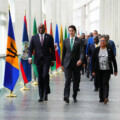The Russian invasion of Ukraine entered a new phase last month, partly due to the heroic efforts of the Ukrainian army and partly due to continued support from the West.
Although the success has been impressive, it leaves two concerns for Ukrainians going forward: an exhausted army and a distracted West.
The United States, NATO, and many supporting Western countries have provided training and military equipment to Ukraine, including long-range artillery like the HIMARS precision-guided rocket strike system. It has had significant success on the battlefield against Russian forces, but both countries’ militaries are in rough shape. Russia has 80,000 estimated dead and wounded and has maybe lost half its modern frontline main battle tanks.
Ukrainian losses are estimated at somewhere between 35,000 and 40,000 dead and wounded troops with many civilian casualties and large tracts of the country destroyed by Russian forces. Ukrainian forces are fighting well and by all accounts are tired but morale continues to be good. They are continuously being re-equipped and trained by NATO. The country has fully mobilized its war effort.
All of the historic weaknesses of the Russian war machine have revealed themselves with this invasion and war with Ukraine. Morale at the front and behind the front appears to be low among Russian forces. Russia has just now started to mobilize for war where its full military numerical advantage can come into play and it has to date avoided the use of chemical and nuclear weapons to press its total war aim to seize the entirety of Ukraine. We also continue to see signs of a Putin-ordered purge in the spirit of Joseph Stalin of his national security infrastructure at home and abroad.
Putin has been around grand strategy and the practice of national security and war at a high level most of his life and he is seemingly being bested by Volodymyr Zelenskyy, a career comedian and actor. If you are Vladimir Putin, frustration and desperation run high.
A few things are becoming clear as the war drags on. Ukraine will survive and may even better its current situation without meeting its strategic war aim, as long as it continues to stay in the Western press and continues to receive NATO training and heavy military equipment. And, most importantly, if the U.S. and West remain undistracted. Even so, it will have to avoid the prospect of “bleeding itself white” in a counter-offensive in the south at Kherson, Kharkiv, Luhansk, and Donetsk Oblast that leaves it vulnerable elsewhere to a Russian counter-offensive with huge numbers of conscript troops in the coming months and winter.
Russia still seems to maintain the confidence of its national security and economic elite and Russian society as a whole. Economic sanctions have been tough and harmful to Russian interests but, to date, are not a game changer. Russia is playing at economic, energy, and food security warfare at a high level and very successfully forcing cracks in the EU, NATO, and the UN. Russia seems to have settled into the war of attrition for the long term and will not easily let go of its current positions in Ukraine.
Russia won’t succeed at achieving its war aims with its current strategy and without resorting to full mobilization for war, unless of course the U.S. and NATO are distracted by China and Taiwan, by North Korea, or by Iran. Or unless North Korea sends its offered 100,000 troops to reinforce the Russian war effort. These could be wild card game changers. Just as Ukraine cannot bleed itself white in the south at Kherson or Kharkiv, Russia must avoid the same in its Donetsk offensive. This war of attrition continues with no end or decisive victory in sight.
Russia’s brutal eight-year war of aggression against Ukraine has served as the backdrop of the Free World’s fight with the axis of evil dictators of today. The war has become a war of attrition where each country is virtually stalled on the battlefield searching in vain for a strategic miracle that has not been forthcoming.
In war, a warring party or state wins when it meets and succeeds in its stated military objectives and war aims. Russia began its February 24 invasion of Ukraine with the strategic war aim of seizing all of Ukraine. Ukraine’s war aim has remained the same since Russia’s 2014 invasion—the liberation of all occupied Ukrainian territory, including Russian-annexed Crimea. Neither state is even close to achieving its stated strategic war aims.
In 2014, Russia seized Crimea in its entirety in the south on the Black Sea and parts of Luhansk and Donetsk Oblasts in the eastern part of Ukraine. This time, Russia invaded Ukraine with the hope of a blitzkrieg-type campaign to seize Ukraine and its capital Kyiv in days, if not hours. When that failed, Russia reverted to a campaign centred on Kharkiv and the northeast of Ukraine. When the Kharkiv campaign stalled, Russia with some success, pressed its offensive to seize the Black Sea coast all the way to Moldova, but the offensive failed in advancing past Kherson Oblast directly above Crimea.
Russia then conveniently, but not convincingly, restated its war aims as the south coast of Ukraine and all of Donetsk and Luhansk Oblasts in the east, which have already been contested in ongoing active fighting since 2014.
By September, six months into Russia’s second invasion of Ukraine, Russia held almost the entirety of Luhansk Oblast, large parts of Donetsk Oblast in the east and Zaporizhzhia Oblast, Kherson Oblast, and Crimea Oblast in the south along the Black Sea.
Russia’s main offensive action is to encircle “the Cauldron.”The term refers to being trapped in a boiling containment where the encircled combatant is hotly resisting attack. The Cauldron takes in the Donetsk Oblast between Izyum and Donetsk in eastern Ukraine, completing the capture of Luhansk and Donetsk and the entirety of the Donbas region. In the south, Russia has surrendered the initiative to a defensive posture against Ukrainian forces engaged in a counter-offensive against the northern parts of Zaporizhzhia and Kherson.
Russia continues to make slow grinding progress with its forces in Donetsk, while Ukraine has modest successes in and around Kherson, but there has not been a game changer. Both belligerents are now coming up against strong defensive works and reinforcements. Ukraine’s surprise Kharkiv offensive has succeeded in liberating Kharkiv Oblast and challenging Russian forces in Luhansk and Donetsk and it has killed Russia’s northern spearhead attacking Donetsk, but it is not clear to what end.
It should be noted that a Ukrainian insurgency has started in the south of the country with some limited successes. But Russia has now moved forward with partial mobilization to put between 300,000 and a million soldiers into the field and forced Russian referendums on occupied territories in Luhansk, Donetsk, Kherson, and Zaporizhzhia.
All four territories “voted” to join Russia in heavily rigged votes and are on their way to being Russian territory protected by Russian nuclear forces as raw Russian conscripts show up at frontline units. In the past few months, the threat of Russia using chemical and even low-yield tactical nuclear weapons has moved from highly unlikely to an imminent threat.
Recommended for You

Ginny Roth: J.D. Vance, Pierre Poilievre, and how they slice their economic pie

David Polansky: As President Biden leaves the race, will the Democratic Party hodgepodge hold?

RCMP spending to protect MPs may have risen 112% since 2018, as Canadian politicians face greater rise in threats

Peter Menzies: The mainstream media should love Doug Ford, now that he’s subsidizing them








